Food for thoughts
June 20, 2024
Thesaurus : Doctrine
► Référence complète : V.-O. Dervieux, "Israël à Eurosatory : la justice éparpillée « façon puzzle » ?", Actu-Juridique.fr, 20 juin 2024.
____
June 19, 2024
Thesaurus : 02. Cour de cassation
June 19, 2024
Thesaurus : Soft Law
► Référence complète : Commission d'enquête du Sénat, Les moyens mobilisés et mobilisables par l’État pour assurer la prise en compte et le respect par le groupe TotalEnergies des obligations climatiques et des orientations de la politique étrangère de la France, juin 2024, 350 p.
____
📓lire les comptes rendus des auditions
____
________
June 18, 2024
Thesaurus : 08. Juridictions du fond
► Référence complète : Cour d'appel de Paris, Pôle 5, Chambre 12, 18 juin 2024, n° RG 23/14348, TotalEnergies
____
____
🏛️consulter une présentation de l'arrêt rendu le même jour dans l'affaire dite Suez
____
🏛️consulter une présentation de l'arrêt rendu le même jour dans l'affaire dite EDF
____
📰lire le communiqué de presse accompagnant le prononcé de ces trois arrêts
____
📝Commentaires de cette décision :
- Rev. int. compliance, n°4, 30 juillet 2024, act. 135
________
June 18, 2024
Thesaurus : 08. Juridictions du fond
► Référence complète : Cour d'appel de Paris, Pôle 5, Chambre 12, 18 juin 2024, n° RG 21/22319, EDF
____
____
🏛️consulter une présentation de l'arrêt rendu le même jour dans l'affaire dite TotalEnergies
____
🏛️consulter une présentation de l'arrêt rendu le même jour dans l'affaire dite Suez
____
📰lire le communiqué de presse accompagnant le prononcé de ces trois arrêts
____
📝Commentaires de cette décision :
- Rev. int. compliance, n°4, 30 juillet 2024, act. 135
________
June 18, 2024
Thesaurus : 08. Juridictions du fond
► Référence complète : Cour d'appel de Paris, Pôle 5, Chambre 12, 18 juin 2024, n° RG 23/10583, Suez
____
____
🏛️consulter une présentation de l'arrêt rendu le même jour dans l'affaire dite TotalEnergies
____
🏛️consulter une présentation de l'arrêt rendu le même jour dans l'affaire dite EDF
____
📰lire le communiqué de presse accompagnant le prononcé de ces trois arrêts
____
📝Commentaires de cette décision :
- Rev. int. compliance, n°4, 30 juillet 2024, act. 135
________
June 13, 2024
Editorial responsibilities : Direction of the collection "Regulations & Compliance", JoRC & Dalloz
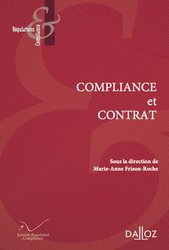
► Référence complète : M.-A. Frison-Roche (dir.), Compliance et Contrat, coll. "Régulations & Compliance", Journal of Regulation & Compliance (JoRC) et Dalloz, à paraître.
____
📘Parallèlement, un ouvrage en anglais, Compliance & Contract, est publié dans la collection éditée par le Journal of Regulation & Compliance (JoRC) et les Éditions Bruylant.
____
🧮Cet ouvrage vient à la suite d'un cycle de colloques 2023 organisés par le Journal of Regulation & Compliance (JoRC) et des Universités qui lui sont partenaires.
____
📚Ce volume s'insère dans la lignée des ouvrages qui dans cette collection sont consacrés à la Compliance.
► Lire les présentations des autres ouvrages de la Collection portant sur la Compliance :
- les ouvrages suivants :
🕴️M.A. Frison-Roche (dir.), 📕Le système probatoire de la Compliance, 2025
- les ouvrages précédents :
🕴️M.A. Frison-Roche (dir.), 📕L'obligation de Compliance, 2024
🕴️M.A. Frison-Roche et M. Boissavy (dir.), 📕Compliance & droits de la défense. Enquête interne - CJIP - CRPC, 2024
🕴️M.A. Frison-Roche (dir.), 📕La juridictionnalisation de compliance, 2023
🕴️M.A. Frison-Roche (dir.), 📕Les buts monumentaux de la Compliance, 2022
🕴️M.A. Frison-Roche (dir.), 📕Les outils de la Compliance, 2021
🕴️M.A. Frison-Roche (dir.), 📕Pour une Europe de la Compliance, 2019
🕴️N. Borga, 🕴️J.-Cl. Marin et 🕴️J-.Ch. Roda (dir.), 📕Compliance : Entreprise, Régulateur, Juge, 2018
🕴️M.A. Frison-Roche (dir.), 📕Régulation, Supervision, Compliance, 2017
🕴️M.A. Frison-Roche (dir.), 📕Internet, espace d'interrégulation, 2016
📚Consulter tous les autres titres de la collection.
___
► Présentation générale de l'ouvrage : L'ouvrage précédemment publié dans la collection "Régulations & Compliance" porte sur L'obligation de Compliance. Le contrat y est évoqué, non seulement parce qu'en soi le contrat est source d'obligations, mais encore parce qu'en pratique les entreprises ont rapidement contractualisé leur obligation légale de compliance.
____
🏗️Construction générale de l'ouvrage :
________
June 13, 2024
Thesaurus : 06.1. Textes de l'Union Européenne
► Full Reference: Regulation (EU) 2024/1689 of the European Parliament and of the Council of 13 June 2024 laying down harmonised rules on artificial intelligence and amending Regulations (EC) No 300/2008, (EU) No 167/2013, (EU) No 168/2013, (EU) 2018/858, (EU) 2018/1139 and (EU) 2019/2144 and Directives 2014/90/EU, (EU) 2016/797 and (EU) 2020/1828 (Artificial Intelligence Act - "IA Act")
____
________
June 13, 2024
Interviews

► Full reference: M.-A. Frison-Roche, "Entreprises et compliance : une justice et des juges plus offensifs" ("Companies and compliance: more aggressive courts and judges"), interview conducted by Jean-Philippe Denis as part of a series of interviews on Compliance Law, in Fenêtres ouvertes sur la gestion (Open windows on management), broadcast by J.-Ph. Denis, Xerfi Canal, recorded December 12, 2023, released on June 14, 2024.
____
🌐consult the December 2023 presentation of the interview on LinkedIn
____
🎥watch the interview video on LinkedIn, with English subtitles
____
🧱consult the general presentation of this series of interviews on Compliance Law
____
► Starting point: Since 2016, Marie-Anne Frison-Roche has been building Compliance Law, notably through a collection co-published in French with Editions Dalloz and co-published in English with Editions Bruylant:
🧱read the presentation in English of the series in French, Régulations & Compliance ➡️click HERE
🧱read the presentation of the series in English, Compliance & Regulation ➡️click HERE
____
► Summary of interview:
Jean-Philippe Denis. Question :
Marie-Anne Frison-Roche. Answer. :
____
J.-Ph D. Q. : Thus
MaFR. A. : Yes,
____
J.-Ph. D. Q. : Thus
MaFR. A. : Yes,
________
June 13, 2024
Thesaurus : 02. Lois
► Référence complète : Loi n°2024-537 du 13 juin 2024 visant à accroître le financement des entreprises et l’attractivité de la France, J.O. 14 juin 2024
____
📝lire la loi
____
Son article 25 dispose : "La section 5 du chapitre I er du titre I er article L. 311-16-1 ainsi rédigé : du livre III du code de l’organisation judiciaire est complétée par un « Art. L. 311-16-1. – La cour d’appel de Paris, qui comprend une chambre commerciale internationale, connaît : « 1 o Des recours en annulation des sentences rendues en matière d’arbitrage international, dans les cas et les conditions prévus par le code de procédure civile ; « 2 o Des recours contre une décision qui statue sur une demande de reconnaissance ou d’exequatur d’une sentence rendue en matière d’arbitrage international, dans les cas et les conditions prévus par le même code. »
____
June 13, 2024
Thesaurus : 06.1. Textes de l'Union Européenne
► Full Reference: Directive (EU) 2024/1760 of the European Parliament and of the Council of 13 June 2024 on corporate sustainability due diligence and amending Directive (EU) 2019/1937 and Regulation (EU) 2023/2859 (CS3D)
____
► read the text of the directive
____
📧see on LinkedIn the article published by Marie-Anne Frison-Roche in the Newsletter MAFR. Regulation, Compliance, Law, on the occasion of the publication of this directive in the Official Journal of the European Union
________
June 12, 2024
Conferences

🌐follow Marie-Anne Frison-Roche on LinkedIn
🌐subscribe to the Newsletter MAFR Regulation, Compliance, Law
____
► Full Reference: M.-A. Frison-Roche, Participation in the panel "Une Gouvernance responsable : vers un mieux vivre ensemble ?" ("Responsible governance: towards a better way of living together"), in Grenelle du Droit 5. L'avenir de la filière juridique, Association française des juristes d'entreprise ("The future of the legal profession"), AFJE), Cercle Montesquieu and Paris Panthéon-Sorbonne University, Campus Port-Royal Université Paris 1 Panthéon-Sorbonne, 1 rue de la Glacière, 75013 Paris, June 12, 2024
____
🧮See the full programme of this event (in French)
____
🎥watch the interview made just after this round-table discussion (in French)
____
🪑🪑🪑🪑🪑 will also be taking part in this round-table discussion:
🕴️Yves Garagnon, Chairman of Dilitrust,
🕴️Pierrick Le Goff, lawyer, partner at De Gaulle Fleurance,
🕴️Sabine Lochmann, Chairman of Ascend,
🕴️Vincent Vigneau, President of the Commercial, Economic and Financial Chamber of the Cour de cassation (French Judicial Supreme Court)
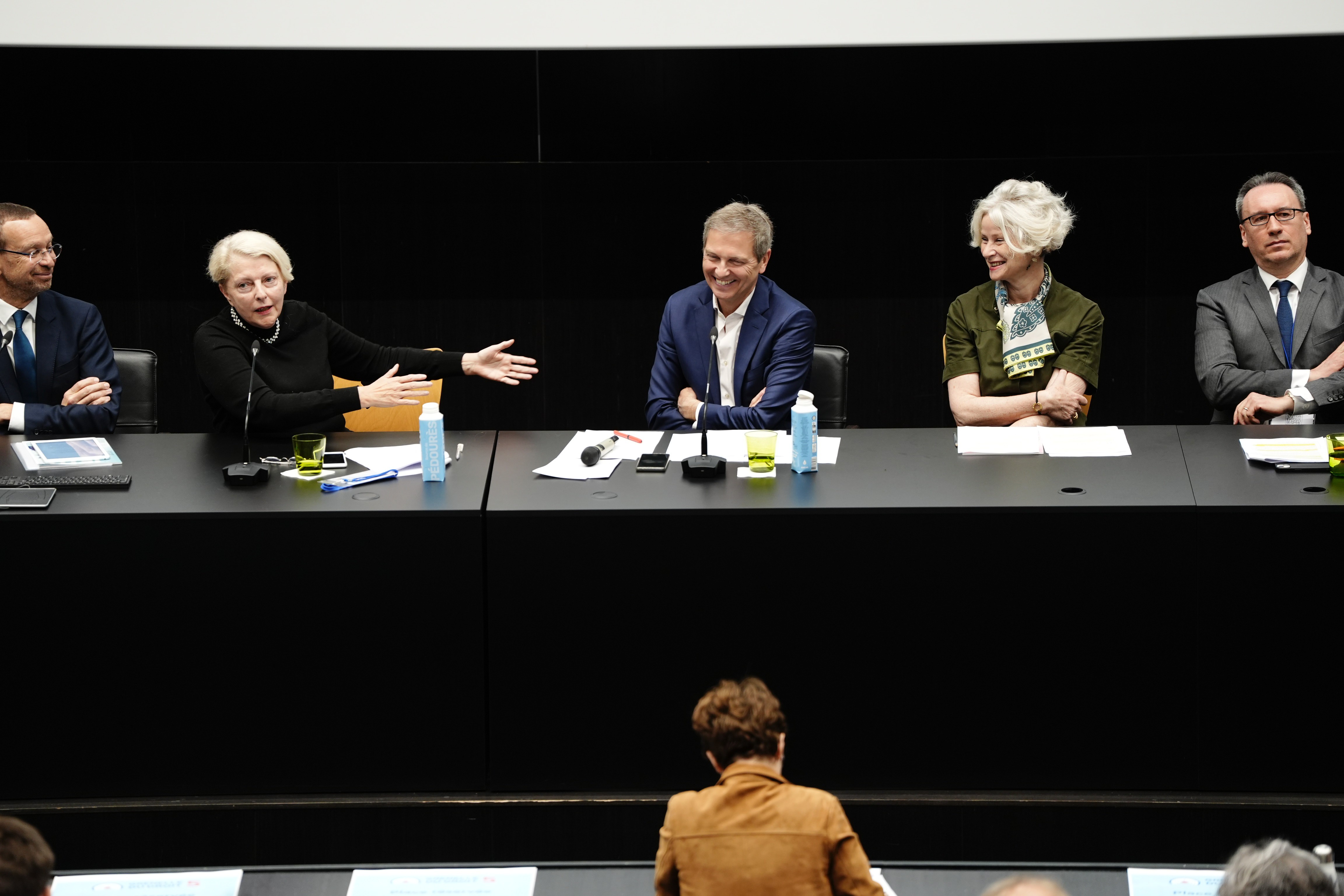
____
► English presentation of my intervention in this event's opening plenary round-table: In this plenary round table which opens the event, devoted to the theme of 'responsible corporate governance', for my interventions based on my work I will have the opportunity to address more particularly these different perspectives:
- How the new Compliance Law, which gives concrete expression to the responsibility of enterprises in a new relationship with States and with civil society, constitutes a 'legal revolution
- 💡for the record, mafr,📝Compliance Law, 2016 ; (ed.) 📘Compliance Monumental Goals, 2022
- how the judgment handed down by the Tribunal judiciaire de Paris (Paris First Instance Civil Court) on 28 February 2023 (Total Ouganda case) is remarkable and already constitutes a turning point in case law
- 💡for the record, mafr, 🎤audition as amica curiae, hearing of 26 October 2022 before the first instance Paris Court; (ed)📘Compliance Jurisdictionalisation, 2024
- how the relationship between States and enterprises is being renewed by this profound legal movement expressed by Compliance Law
- 💡for the record, mafr et M. Boissavy (ed.), 📕Compliance et droits de la défense - Enquêtes internes, CJIP, CRPC, mafr (dir.), 📘 Compliance Obligation, 2025
- how internal lawyers have a decisive and central role to play in this movement, particularly in the mechanism of vigilance / corporate sustainability due diligence, the "cutting edge" of Compliance Law,
- 💡for the record, mafr, 📝Contract of Compliance, Compliance stipulations, 2023 ; (ed.), 📘Compliance and Contract, 2025
- what is meant by the "Ex Ante responsibility" of enterprises, which does not necessarily entail their Ex Post liability, a distinction which lawyers are the guardians of
- 💡for the record, mafr, 📝La responsabilité Ex Ante, pilier du Droit de la Compliance ("Ex-Ante Responsability, Compliance Law Pillar"), 2021
- how European Compliance Law is profoundly humanist, an identity that distinguishes European Compliance from American Compliance and, above all, from Chinese Compliance.
- 💡for the record, mafr (ed.), 📕Pour une Europe de la Compliance ("For the Europe of the Compliance"), 2017
________
read the article about this round table written by Delphine Bauer in Actu-Juridique (in French)
June 6, 2024
Editorial responsibilities : Direction of the collection "Cours-Série Droit privé", Editions Dalloz (33)
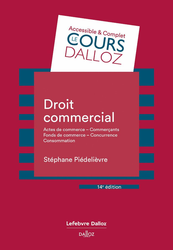
► Référence complète : S. Piédelièvre, Droit commercial (Actes de commerce - Commerçants - Fonds de commerce - Concurrence - Consommation), Dalloz, coll. "Cours Dalloz-Série Droit privé", 1ière éd., 1997, 14ième éd., 2024, 480 p.
____
► Présentation générale de l'ouvrage : Cet ouvrage, qui s’adresse principalement aux étudiants de L2 et L3, propose une approche claire et détaillée de la notion de commercialité. Il intéressera également les praticiens souhaitant actualiser leurs connaissances en droit commercial.
Complexe dans le système français, cette notion suscite de nombreuses questions appelant des solutions concrètes d’une grande importance comme les régimes de compétence et de preuve. Cet ouvrage aborde la question du droit commercial à travers les actes de commerce, les commerçants, les fonds de commerce, ainsi que la concurrence et la consommation.
L’auteur s’est appliqué à présenter les règles qui constituent les principes de l’activité marchande.
____
📕lire la quatrième de couverture
____
____
📚consulter l'ensemble de la collection dans lequel l'ouvrage a été publié
________
June 3, 2024
Thesaurus : Convention, contract, settlement, engagement
► Référence complète : N. Yax, H. Anlio & S. Palminteri, "Studying and improving reasoning in humans and machines", Communications Psychology volume 2, Article number: 51 (2024)
____
May 31, 2024
Thesaurus : 06.1. Textes de l'Union Européenne
► Full Reference: Regulation (EU) 2024/1624 of the European Parliament and of the Council of 31 May 2024 on the prevention of the use of the financial system for the purposes of money laundering or terrorist financing
____
________
May 31, 2024
Thesaurus : 06.1. Textes de l'Union Européenne
► Référence complète : Directive (EU) 2024/1640 of the European Parliament and of the Council of 31 May 2024 on the mechanisms to be put in place by Member States for the prevention of the use of the financial system for the purposes of money laundering or terrorist financing, amending Directive(EU) 2019/1937, and amending and repealing Directive (EU) 2015/849
____
________
May 31, 2024
Thesaurus : 06.1. Textes de l'Union Européenne
► Full Reference: Regulation (EU) 2024/1620 of the European Parliament and of the Council of 31 May 2024 establishing the Authority for Anti-Money Laundering and Countering the Financing of Terrorism and amending Regulations (EU) No 1093/2010, (EU) No 1094/2010 and (EU) No 1095/2010
____
________
May 30, 2024
Thesaurus : Doctrine
► Référence complète : Th. Douville, "De l'approche extensive de la prise de décision exclusivement automatisée (à propos du refus d'un prêt fondé sur une note de solvabilité communiquée par un tiers)", D. 2024, pp. 1000-1004
____
🦉Cet article est accessible en texte intégral pour les personnes inscrites aux enseignements de la Professeure Marie-Anne Frison-Roche
________
May 27, 2024
Thesaurus : Soft Law
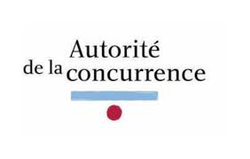
► Référence complète : Autorité de la concurrence (ADLC), Communiqué relatif aux orientations informelles de l’Autorité en matière de développement durable, 27 mai 2024, 6 p.
____
____
📰lire le communiqué de presse accompagnant la publication de ce document
________
May 27, 2024
Conferences
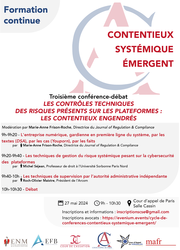
🌐suivre Marie-Anne Frison-Roche sur LinkedIn
🌐s'abonner à la Newsletter MAFR Regulation, Compliance, Law
____
► Référence complète : M.-A. Frison-Roche, "Un contentieux systémique in vivo : le cas dit des sites pornographiques", in Les contrôles techniques des risques présents sur les plateformes et les contentieux engendrés, in cycle de conférences-débats "Contentieux Systémique Émergent", organisé à l'initiative de la Cour d'appel de Paris, avec la Cour de cassation, la Cour d'appel de Versailles, l'École nationale de la magistrature (ENM) et l'École de formation des barreaux du ressort de la Cour d'appel de Paris (EFB), sous la responsabilité scientifique de Marie-Anne Frison-Roche, 27 mai 2024, 9h-10h30, Cour d'appel de Paris, salle Cassin
____
🧮consulter le programme complet de cette manifestation
____
🧮consulter le programme de l'ensemble du cycle Contentieux Systémique Émergent
____
🔲consulter les slides ayant servi de support à l'intervention
____
🌐consulter sur LinkedIn les slides ayant servi de support à l'intervention
____
🎤consulter une présentation de la seconde intervention de Marie-Anne Frison-Roche prononcée lors de cette conférence-débat : "Le contentieux Systémique Emergent du fait du système numérique"
____
____
____
► Résumé de cette conférence :
________

May 27, 2024
Organization of scientific events

► Full Reference: Les contrôles techniques des risques présents sur les plateformes et les contentieux engendrés (Technical risks controls on platforms and disputes arising from them), in cycle of conference-debates "Contentieux Systémique Émergent" ("Emerging Systemic Litigation"), organised on the initiative of the Cour d'appel de Paris (Paris Cour of Appeal), with the Cour de cassation (French Court of cassation), the Cour d'appel de Versailles (Versailles Court of Appeal), the École nationale de la magistrature - ENM (French National School for the Judiciary) and the École de formation des barreaux du ressort de la Cour d'appel de Paris - EFB (Paris Bar School), under the scientific direction of Marie-Anne Frison-Roche, May 27, 2024, 9h-10h30, Cour d'appel de Paris, Cassin courtroom
____
🧮see the full programme of the cycle Contentieux Systémique Émergent (Emerging Systemic Litigation)
____
🌐see on LinkedIn the report of this event
____
🧱read below the report of this event⤵️
____
► Presentation of the conference: The digital space is full of risks. Some are naturally associated with it, because it is an area of freedom, while others must be countered because they are associated with generally prohibited behaviour, such as money laundering. But the digital space has developed risks which, because of their scale, have been transformed in their very nature: this is particularly true of the distortion permeating certain content and the insecurity that can threaten the entire system itself. Law has therefore entrusted operators themselves with vigilance over what have become ‘cyber-risks’, such as the risk of disinformation, the risk of destruction of communication infrastructures, and the risk of data theft, a systemic prospect that can lead to the collapse of societies themselves.
New legislations has been drafted, in particular the Digital Services Act (DSA), to increase the burdens and powers of firms in this area, with digital companies in the front line, but also supervisory authorities such as the Autorité de régulation de la communication audiovisuelle et numérique - Arcom (French Regulatory Authority for Audiovisual and Digital Communication). The resulting disputes, in which firms and regulators may be allies or opponents, are systemic in nature.
The judge's handling of these "systemic cases", through the procedure and the solutions, must respond to this systemic dimension. The "pornographic websites" case, which is currently unfolding, provides an opportunity to observe in vivo the dialogue between judges when a "systemic case" imposes itself on them.
____
🧮Programme of this event:
Third conference-debate
LES CONTRÔLES TECHNIQUES DES RISQUES PRÉSENTS SUR LES PLATEFORMES ET LES CONTENTIEUX ENGENDRÉS
(TECHNICAL RISKS CONTROLS ON PLATFORMS AND DISPUTES ARISING FROM THEM)
Paris Court of Appeal, Cassin courtroom
Moderated by 🕴️Marie-Anne Frison-Roche, Professor of Regulatory and Compliance Law, Director of the Journal of Regulation & Compliance (JoRC)
🕰️9h-9h10. 🎤Le contentieux Systémique Emergent du fait du système numériqué (Systemic Litigation Emerging from the Digital System), 🕴️Marie-Anne Frison-Roche
🕰️9h10-9h30. 🎤Les techniques de gestion du risque systémique pesant sur la cybersécurité des plateformes (The Systemic Obligation of Security on Platforms and associated Litigation), 🕴️Michel Séjean, Professor of Law at Sorbonne Paris Nord University
🕰️9h30-9h50. 🎤Un cas systémique in vivo : le cas dit des sites pornographiques (An in vivo Systemic Case: the so-called case of pornographic websites),🕴️Marie-Anne Frison-Roche
🕰️9h50-10h10. 🎤Les obligations systémiques des opérateurs numériques à travers le Règlement sur les Services Numériques (RSN/DSA) et le rôle des régulateurs (Systemic Obligations of Operators (DSA) and the role of Regulators), 🕴️Roch-Olivier Maistre, Chair of the Autorité de régulation de la communication audiovisuelle et numérique - Arcom (French Regulatory Authority for Audiovisual and Digital Communication)
🕰️10h10-10h30. Debate
____
🔴Registrations and information requests can be sent to: inscriptionscse@gmail.com
🔴For the attorneys, registrations have to be sent to the following address: https://evenium.events/cycle-de-conferences-contentieux-systemique-emergent/
⚠️The conference-debates are held in person only, in the Cour d’appel de Paris (Paris Court of Appeal).
____
🧱read below a detailed presentation of this event⤵️
________
May 27, 2024
Conferences

🌐follow Marie-Anne Frison-Roche on LinkedIn
🌐subscribe to the Newsletter MAFR Regulation, Compliance, Law
____
► Full Reference: M.-A. Frison-Roche, "Le Contentieux Systémique Emergent du fait du système numérique ("emerging systemic litigation arising from the digital system"), in Les contrôles techniques des risques présents sur les plateformes et les contentieux engendrés (Technical controls on the risks present on platforms and the disputes that arise), in cycle of conferences-debates "Contentieux Systémique Émergent" ("Emerging Systemic Litigation"), organised on the initiative of the Cour d'appel de Paris (Paris Cour of Appeal), with the Cour de cassation (French Court of cassation), the Cour d'appel de Versailles (Versailles Court of Appeal), the École nationale de la magistrature - ENM (French National School for the Judiciary) and the École de formation des barreaux du ressort de la Cour d'appel de Paris - EFB (Paris Bar School), under the scientific direction of Marie-Anne Frison-Roche, May 27,2024, 9h-10h30, Cour d'appel de Paris, Cassin room
____
🧮see the full programme of this event
____
____
🔲see the slides (in French), basis of this conference
____
🌐read on LinkedIn the summary of this conference les slides
____
🎤read the presentation of the second conference in this manifestation: "Un contentieux systémique in vivo : le cas dit des sites pornographiques" ("a Systemic Litigation in vivo: the case of pornographic prestations platforms")
____
____
____
► Summary of this conference: This speech is a prelude to the three more specific speeches and aims to show how the digital system, by its very nature, produces and will produce "Systemic Litigation".
Systemic Litigation" is defined by "cases" (a procedural notion) brought before judges, who may be judges of first instance, or possibly emergency judges, in which the interests, or even the future, of a system are involved beyond the dispute between the parties.
This Systemic Case may be brought before a specialised judge, including the juridictional body of a Regulatory or Supervisory Authority, but also before a judge of ordinary Law, on the basis of a special text but possibly on the basis of a text of ordinary Law. This can lead to a fragmentation of litigation, even though the unity of the system remains, or even is at stake, in the present and in the future.
The "digital system" is an example of the "natural" production of Systemic Litigation which arise as a result of the Digital System alone, in particular because of the systemic risks inherent in this system, and the fact that their prevention and management are internalised in the operators who have built and manage the system (Compliance Law). The issue is therefore one of Interregulation.
Platforms in particular give rise to Systemic Litigation because of the specific nature of certain risks, for example disinformation, terrorism, destruction of rights (copyright being just one example), the risk of minors having access to content that is destructive for them, and so on.
Digital Systemic Litigation has only just begun.
It is essential that judges are prepared for this and that they face up to it together through dialogue.
________
May 24, 2024
Conferences
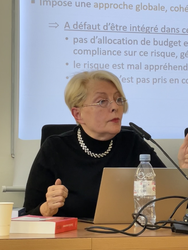
🌐follow Marie-Anne Frison-Roche on LinkedIn
🌐subscribe to the Newsletter MAFR Regulation, Compliance, Law
____
► Full Reference: M.-A. Frison-Roche, "Synthèse" ("Synthesis"), in Concurrence : les enjeux de la Compliance, May 24, 2024, Paris, Collège européen de Paris, Paris Panthéon-Assas University, 28 rue Saint-Guillaume
____
🧮see the full programme of this event (in French):
🌐read the la newsletter MAFR Law, Compliance, Regulation on 26 Mai 2024 about this colloquium and this synthesis (in English)
____
► Summary of this concluding conference:The conference was based on the 'framework document' on conformity programmes published by the French Competition Authority, the Autorité de la concurrence, on 24 May 2022 and focused on one of the tools used, namely risk mapping. The care taken to bring together academics whose job it is to give an account of reality by classifying and naming it, which makes it easier to handle, and people who every day in enterprises find solutions to anticipate difficulties so that they can be resolved, or even prevented from arising, has borne fruit.
____
From all the presentations and discussions, 4 perspectives emerge, each showing what has been achieved, what may still emerge in interaction with all the other mechanisms in Compliance Law that incorporate risk mapping (for instance ,the French 2016 so-called "Sapin 2" law, the French 2017 so-called "Vigilance" law, the CS3D European directive, etc.) and the other mechanisms that are correlated with risk mapping (audit, internal investigations, evidence likely to be raised before a judge by the enterprise and/or by a stakeholder and what remains uncertain in this 2022 framework document.
_____
The first perspective is the basis of these recommendations, encouragement, methods, advice, etc.
The second perspective is the means developed to establish and implement these compliance programmes.
The third perspective is the scope of this framework document, which also depends to a large extent on the scope of the compliance programmes adopted by the firms themselves.
The fourth perspective is that of the subjects of law who are obliged, or who benefit from the adoption of such compliance programmes in Competition Law.
____
During this conclusion, based solely on what each speaker had to say, I continued my reflections in each of these 4 directions.
This reminded me of some of my work made in English on this subject:
- M.-A. Frison-Roche (ed.), 📘Compliance Tools, ,2022
- M.-A. Frison-Roche, 🚧 Support from Compliance Law for day-to-day management of Competition Law, 2021
- M.-A. Frison-Roche, 🚧 Competition Law and Compliance Law, 2018
_________
May 23, 2024
Interviews

🌐suivre Marie-Anne Frison-Roche sur LinkedIn
🌐s'abonner à la Newsletter MAFR Regulation, Compliance, Law
____
► Référence complète : M.-A. Frison-Roche, "Avec l'émergence du contentieux systémique, "le juge intègre le futur"", entretien avec Floriane Valdayron, Journal Spécial des Sociétés (JSS), 23 mai 2024
____
____
► Présentation de l'entretien par le journal : "Une série de causes systémiques impliquées au coeur d'un cas particulier : voici en quelques mots les fondations du contentieux systémique. Cette notion émerge avec l'apparition de nouvelles structures dans la société, comme le numérique, ou bien de nouvelles consciences politiques face à des systèmes anciens, comme l'environnement. A la croisée du juridique, de la politique et de la société civile, ce phénomène pousse juridictions et magistrats à se spécialiser. Décryptage.".
________
May 22, 2024
Interviews

► Full reference: M.-A. Frison-Roche, "Compliance et management : la médiation plutôt que la sanction ?" ("Compliance and management: mediation rather than punishment?"), interview conducted by Jean-Philippe Denis as part of a series of interviews on Compliance Law, in Fenêtres ouvertes sur la gestion (Open windows on management), broadcast by J.-Ph. Denis, Xerfi Canal, recorded December 12, 2023, released on May 22, 2024
____
🌐consult the December 2023 presentation of the interview on LinkedIn
____
🌐read the MAFR. Law, Compliance, Regulation of April 2024 based on this interview
____
🧱consult the general presentation of this series of interviews on Compliance Law
____
🎥view the full interview on Xerfi Canal
____
► Starting point: Since 2016, Marie-Anne Frison-Roche has been building Compliance Law, notably through a collection co-published in French with Editions Dalloz and co-published in English with Editions Bruylant:
🧱lire la présentation de la collection en langue française, Régulations & Compliance ➡️click HERE
🧱read the presentation of the series in English, Compliance & Regulation ➡️click HERE
____
► Summary of interview:
Jean-Philippe Denis. Question: To put it bluntly, isn't Compliance Law expressed by the BNP Paribas fine?
Marie-Anne Frison-Roche. Answer: It is still through this fine that Compliance is often perceived. How regrettable...
____
Jean-Philippe Denis. Q.: At least, that's how the Politician realised there was a subject....
Marie-Anne Frison-Roche. A. : This is true, and not just for politicians and firms since this case has had an impact on European public opinion. This matter has therefore become known for the violence of the sanctions, and the intervention of heads of State to reduce their consequences. But we're talking about sanctions. Meanwhile, others talk about compliance through soft law, soft co-regulation, charters and soft commitments, the contours of which are sometimes uncertain. Today, adjustments are made regarding the Monumental Goals of preserving the systems on which this Compliance Law is based, and tools are used on this basis, tools with which lawyers are very familiar: contracts. Through contracts, enterprises structure their compliance obligations.
____
Jean-Philippe Denis. Q.: You point out that Compliance Law is becoming more civilised and that more people are resorting to mediation.
Marie-Anne Frison-Roche. A.: Yes, Compliance Law is becoming more civilised, and civil law is becoming increasingly important, particularly through Contract Law, with stipulations being inserted to prevent human rights or environmental infringements. As Compliance Law operates on an ex-ante basis, the enterprise will organise dialogue with stakeholders, in particular when vigilance plans are drawn up, Vigilance mechanism being the spear head of Compliance Law. If the situation becomes litigious and the matter is referred to the courts, the civil courts, whose role is growing, will themselves organise mediation. Mediation, which is now part is an instrument for bringing the parties together and finding solutions.
________